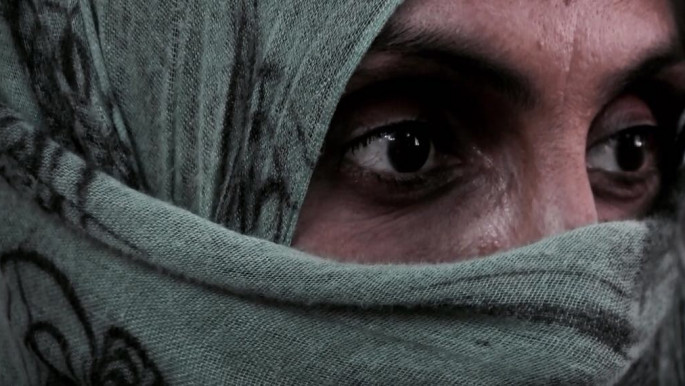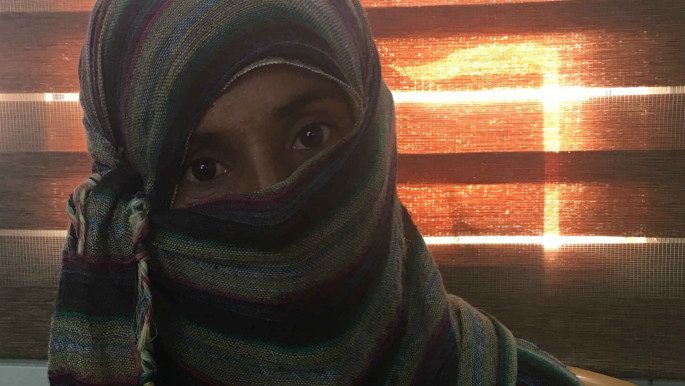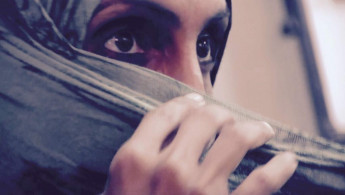The mental trauma of Iraq's displaced
"My mother took me out of school, because under IS rule the only things we were taught there were how to kill or who was an infidel," she tells The New Arab.
Last December, Fatima fled the Iraqi city together with her family. They now live in the Hassan Sham refugee camp, 40 kilometres east of their former home.
"My dad was severely beaten by [IS] as we tried to escape from Mosul. I remember that day; they beheaded 30 men. They tried to stop everyone leaving the city. Now, I live my life suspended. I feel that IS destroyed my dreams. I do not really know how I will move forward after what they did to us."
Lasting scars
Fatima, as with the majority of the 10,200 internally displaced persons living in Hassan Sham camp, lives with the enduring psychological injuries of her daily life under IS rule, and she now receives support from the Mental Health Psychosocial Support Programme run by IOM, the International Organization for Migration.
The United Nations estimates that among 838,950 people displaced the battle for Mosul alone, about 80 percent suffered psychological trauma, with 15-20 percent reporting "mild or moderate" symptoms and 3-4 percent "severe" symptoms.
"The main symptoms we treat are depression, and psychosomatic reactions such as loss of sleep or sight," Abdulhalim Hasan, a Syrian psychiatrist with IOM, told The New Arab. "The women tend to lose their hair or the ability to breastfeed their children. Relatives of people who joined or cooperated with IS often show vindictive impulses."
 |
| The frequency of mass killings, rapes and torture have left their mark on the mental health of those forced to live under the Islamic State group [Laura Cappon] |
Dr Hasan is from Damascus. Before he and his family fled the city, he was a psychiatrist at a mental health centre in Douma, 10 kilometres north-east of the capital. They headed first to northern Syria, and from there to Turkey. The family eventually settled in Jordan.
His daughter suffers from the trauma of surviving a mortar attack at her school. Five of her classmates were killed.
"Those who have suffered torture or lived for years under the Islamic State group are in a period of transition and they struggle to adapt to their new conditions," said Dr Hasan.
"The situation is very sensitive, especially for women and children. Kids are asking their parents why they no longer have an house, or why some of their relatives died. Some think they have been punished by God - or believe the war came because they disobeyed their mothers."
Lina is a 40-year-old mother of 14 children. She left behind a destroyed house in Mosul and the tomb of her husband, killed by cancer.
"We didn't have any food and couldn't move, we could not even get out of the house," she told The New Arab. "Everything was prohibited. They even told us what to wear: we had to be totally covered."
 |
Kids are asking their parents why they no longer have an house or why some of their relatives died. Some think they have been punished by God - or believe the war came because they disobeyed their mothers |  |
Many former residents of Mosul share the same tales of coercion and brutality under the rule of the self-styled caliphate.
"It was a very tough experience. Everything was forbidden: television, cell phones. Those who broke the rules were fined or beaten," says Zeina, a 30 year-old from Eastern Mosul. "I just stayed home because if I wanted to go out I would have had to cover myself completely, I could not have even left my face uncovered. I tried to send my children to the kindergarten or out to play, but they were punished as well."
Lina and Zeina live now in a camp hosting 10,000 internally displaced persons in Chamakor, 20 kilometres east of Mosul, and they too receive help from IOM's Mental Health Psychosocial Support Programme.
 |
| Tens of thousands of people - men, women and children - bear the scars of life under the Islamic State group, and not all scars are visible [Laura Cappon] |
Post-traumatic stress
In addition to the shock from living under Islamic State rule, Mosul residents still suffer from the stress caused by the fighting and the bombing during the battle for the liberation of the city.
"I remember a specific airplane attack," says teenager Ahmed. "It was brutal. I remember feeling suffocated inside the room where I was. The only thing I could do was holding my head between my legs."
Read more: Poisoned minds and a poisoned sky - the legacy of the Islamic State group
Together with his friends he attends group psychology meetings. For teenagers, doctors here say, this collective approach is key to the most efficient cure for shock absorption. Dr Hasan compares the process to recovering from a physical wound.
According to IOM psychologists and psychiatrists, the full scope of the damage and the possible permanent results can be evaluated only after one year from the beginning of the therapy. Particular attention is given to younger people in order to limit as much as possible the negative effects of this long-term collective shock.
 |
Every family here lost someone... An entire generation will continue to talk about IS. Its memory will remain as much as the memories of Saddam Hussein's government |  |
After the liberation of Mosul, the country faces an uncertain future.
The city's Sunni Arab population has been alienated by the sectarian policies of Nouri al-Maliki, the former Iraqi prime minister and current deputy president. Experts agree that the rapid IS takeover of the city in 2014 was in part due to the extreme distrust of the Sunni residents of the former Shia-led Iraqi government - and they are worried about the future activities of Shia militias still fighting in Nineveh.
Even worse, Mosul's internally displaced persons who lived under the Islamic State group are now perceived by a large part of the Iraqi population as IS supporters or affiliates.
"Every family here lost someone," Dr Hasan says. "An entire generation will continue to talk about IS. Its memory will remain as much as the memories of Saddam Hussein government and of the years following his ousting have remained."
Marta Cosentino contributed to this report
Follow her on Twitter: @lacappon



